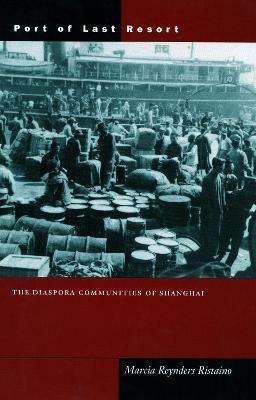Port of Last Resort: The Diaspora Communities of Shanghai

Port of Last Resort: The Diaspora Communities of Shanghai
This book examines two large and generally overlooked diaspora communities, one Jewish and the other Slavic, which found refuge in Shanghai during the period 1900-1950. Victims of discrimination and persecution in their own lands--Central and Eastern Europe, Russia, and Ukraine--they chose Shanghai as their destination because no documentation was required to enter the city and settle there. In their struggle to survive and build a life in this Chinese open port, they encountered severe political, social, economic, and cultural challenges.
The Jewish diaspora community began forming in the early 1900s and increased to more than 18,000 after the initial triumphs of Nazism. The Slavic community eventually numbered about 30,000 people, escaping revolution and persecution from Bolshevik and fascist forces at home and in north China. This book focuses on how these diverse groups, adhering to various religious and cultural traditions, formed communities, preserved their national and cultural identities, chose their leaders, found gainful employment, coped with the alien Chinese culture, educated and raised their children, and established a considerable presence in this large, cosmopolitan city.
The author examines at length the different experiences and responses of the two diaspora groups during World War II under the Japanese occupation of Shanghai. With the Chinese Communist takeover of the city in 1949, both groups found themselves in a renewed struggle to find a home, adding still another chapter to the saga of their diaspora experiences. The book concludes with an account of how the two groups handled this new challenge and where they finally found refuge. Apart from the particulars of the Shanghai experience, the story of the two communities clearly resonates with today's accounts of societies in conflict, dislocated populations, and varied struggles to survive and sustain life under trying conditions.
PRP: 231.47 Lei
Acesta este Pretul Recomandat de Producator. Pretul de vanzare al produsului este afisat mai jos.
208.32Lei
208.32Lei
231.47 LeiIndisponibil
Descrierea produsului
This book examines two large and generally overlooked diaspora communities, one Jewish and the other Slavic, which found refuge in Shanghai during the period 1900-1950. Victims of discrimination and persecution in their own lands--Central and Eastern Europe, Russia, and Ukraine--they chose Shanghai as their destination because no documentation was required to enter the city and settle there. In their struggle to survive and build a life in this Chinese open port, they encountered severe political, social, economic, and cultural challenges.
The Jewish diaspora community began forming in the early 1900s and increased to more than 18,000 after the initial triumphs of Nazism. The Slavic community eventually numbered about 30,000 people, escaping revolution and persecution from Bolshevik and fascist forces at home and in north China. This book focuses on how these diverse groups, adhering to various religious and cultural traditions, formed communities, preserved their national and cultural identities, chose their leaders, found gainful employment, coped with the alien Chinese culture, educated and raised their children, and established a considerable presence in this large, cosmopolitan city.
The author examines at length the different experiences and responses of the two diaspora groups during World War II under the Japanese occupation of Shanghai. With the Chinese Communist takeover of the city in 1949, both groups found themselves in a renewed struggle to find a home, adding still another chapter to the saga of their diaspora experiences. The book concludes with an account of how the two groups handled this new challenge and where they finally found refuge. Apart from the particulars of the Shanghai experience, the story of the two communities clearly resonates with today's accounts of societies in conflict, dislocated populations, and varied struggles to survive and sustain life under trying conditions.
Detaliile produsului








